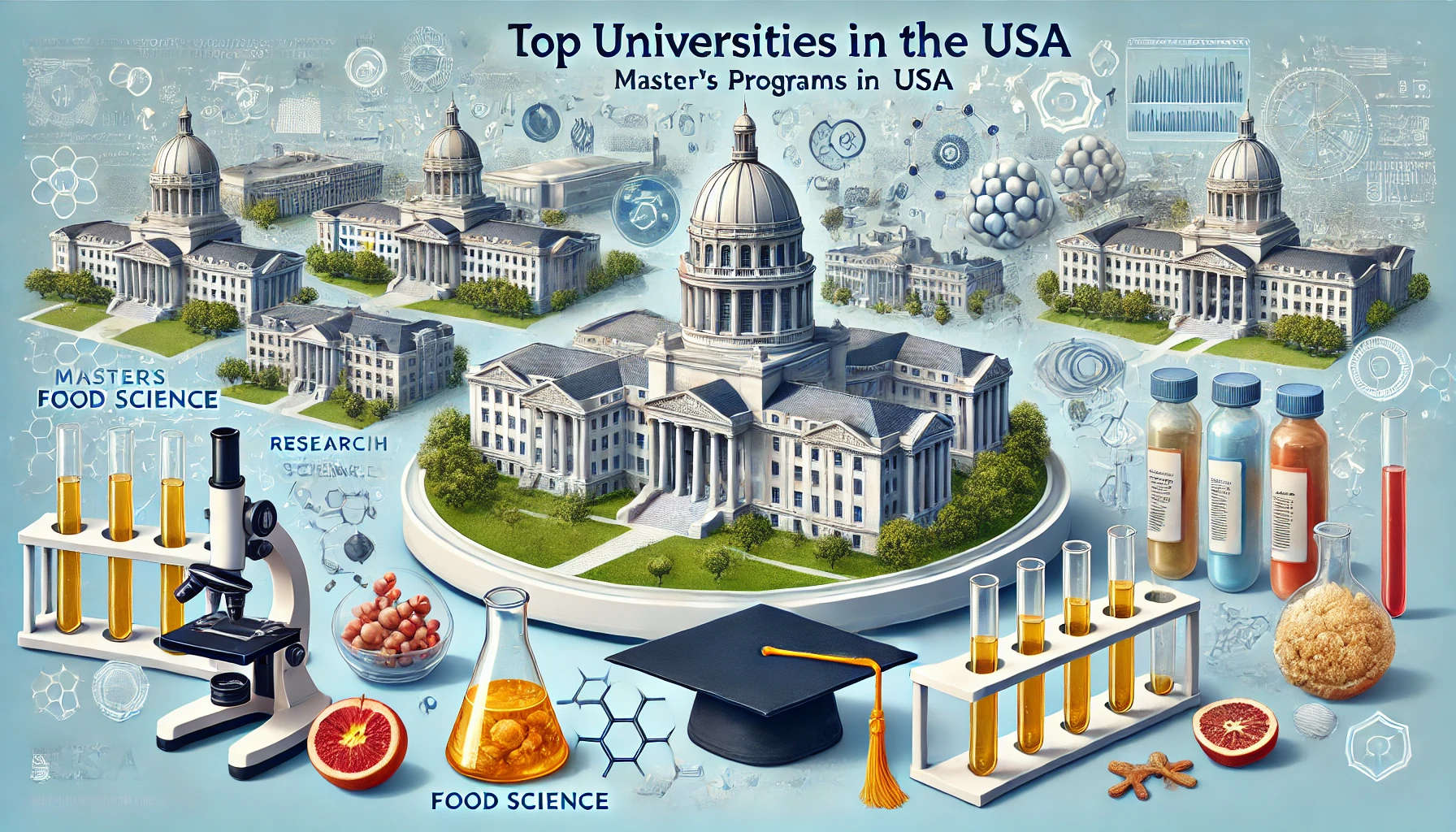The Top 10 Best Food Science Master’s Programs in the USA
Are you passionate about the science behind food and seeking to advance your career? Pursuing a master’s degree in food sciences from one of the top universities in the USA can open doors to numerous opportunities in research, industry, and academia. In this comprehensive guide, we will explore the best food science master’s programs, delve into specific degree offerings, and provide insights into what makes these programs stand out.
Best Food Science Master’s Programs
1. Cornell University
Cornell University is renowned for its robust food science master’s programs. It offers a curriculum rich in research opportunities and industry connections. Students benefit from state-of-the-art laboratories and a faculty comprising leading experts in food sciences.
Key Highlights:
- Strong emphasis on research and development.
- Access to cutting-edge facilities and resources.
- High employability rate post-graduation.
2. University of Illinois, Urbana-Champaign
The University of Illinois at Urbana-Champaign provides a comprehensive master’s program in food sciences that blends theoretical knowledge with practical applications. It is recognized for its contributions to food safety and human nutrition.
Key Highlights:
- Diverse course offerings covering all aspects of food sciences.
- Opportunities for hands-on research and industry internships.
- Collaborative projects with leading food companies.
3. University of California, Davis
UC Davis is a leader in food sciences, particularly known for its focus on sustainability and innovative research. The master’s program here prepares students for advanced roles in food technology and safety.
Key Highlights:
- Focus on sustainable food production and technology.
- Extensive research projects and lab work.
- Collaboration with agricultural and food industries.
Top Universities for Food Science
4. University of Wisconsin, Madison
The University of Wisconsin, Madison, offers an excellent master’s program in food sciences, known for its strong industry connections and job placement rates. The program emphasizes food processing and technology.
Key Highlights:
- High job placement rates in top food companies.
- Courses tailored to industry needs.
- Strong alumni network in the food sciences field.
5. Texas Tech University
Texas Tech University provides a flexible master’s program in food sciences with both thesis and non-thesis options. The university is known for its affordable education and diverse research opportunities.
Key Highlights:
- Affordable tuition and financial aid options.
- Flexible program structures to suit different career goals.
- Extensive research facilities and support.
6. Virginia Tech
Virginia Tech’s master’s program in food sciences is highly regarded for its experiential learning and research opportunities. The university offers a comprehensive curriculum that prepares students for various careers in the food industry.
Key Highlights:
- Strong focus on experiential learning and internships.
- Diverse research areas including food safety and quality assurance.
- High graduation and employment rates.
Best Colleges for Food Science
7. Purdue University
Purdue University’s food science master’s program is known for its rigorous curriculum and strong focus on food safety and quality. The program offers extensive research opportunities and industry collaborations.
Key Highlights:
- Emphasis on food safety and regulatory affairs.
- Strong research and development component.
- Collaboration with food industry leaders.
8. Penn State University
Penn State offers a master’s program in food sciences with a unique interdisciplinary approach. The program integrates food science with nutrition, agriculture, and business.
Key Highlights:
- Interdisciplinary curriculum.
- Strong focus on practical applications and industry needs.
- Opportunities for research and internships.
9. University of Minnesota
The University of Minnesota’s food science master’s program is designed to provide a strong foundation in both theoretical and applied aspects of food sciences. The program is well-regarded for its research capabilities and faculty expertise.
Key Highlights:
- Comprehensive curriculum covering all aspects of food sciences.
- Access to state-of-the-art research facilities.
- Strong industry connections and job placement support.
Top Food Science Universities
10. Michigan State University
Michigan State University offers a highly respected master’s program in food sciences, known for its diverse specializations and strong industry ties. The program prepares students for leadership roles in the food industry.
Key Highlights:
- Diverse specializations including food safety, microbiology, and technology.
- Strong emphasis on industry collaboration and practical experience.
- High employability and alumni success rates.
Specific Master’s Programs in Food Science
Masters in Food Science USA
Pursuing a master’s in food science in the USA provides students with a competitive edge in the global food industry. Programs typically cover various aspects of food production, safety, and technology.
Key Components:
- Core courses in food chemistry, microbiology, and engineering.
- Electives tailored to specific interests such as food safety or product development.
- Research projects and internships with industry partners.
Food Science MS Programs
Food science MS programs offer a balance of coursework and research, preparing students for careers in academia, research, and industry. These programs emphasize practical skills and theoretical knowledge.
Key Components:
- Rigorous coursework in advanced food science topics.
- Research opportunities with experienced faculty.
- Internships and industry projects for hands-on experience.
Food Technology Master’s Degree
A master’s degree in food technology focuses on the technological aspects of food production and processing. These programs are designed to equip students with the skills needed to innovate in the food industry.
Key Components:
- Courses in food engineering, processing, and preservation.
- Hands-on training with modern food technology equipment.
- Collaborative projects with food technology companies.
MS in Food Science USA
An MS in food science in the USA offers students access to some of the best research facilities and faculty in the world. These programs are ideal for those looking to specialize in areas such as food safety, quality control, and nutrition.
Key Components:
- Specialized courses in food safety, quality control, and nutrition.
- Research projects addressing current issues in food sciences.
- Networking opportunities with industry professionals.
Food Science Masters Programs USA
Food science master’s programs in the USA provide comprehensive training in all aspects of food sciences. These programs prepare students for various roles in the food industry, academia, and research institutions.
Key Components:
- Diverse course offerings covering food chemistry, microbiology, and engineering.
- Opportunities for interdisciplinary research and collaboration.
- Strong focus on practical skills and industry applications.
General Food Science Graduate Programs
Food Science Graduate Programs
Food science graduate programs offer advanced training in food sciences, preparing students for careers in research, industry, and academia. These programs emphasize both theoretical knowledge and practical skills.
Key Components:
- Comprehensive coursework in food chemistry, microbiology, and engineering.
- Research opportunities with experienced faculty.
- Internships and industry collaborations for hands-on experience.
Conclusion
Choosing the right university for your master’s in food sciences can significantly impact your career trajectory. Programs from top universities such as Cornell, University of Illinois, and UC Davis offer a blend of academic excellence, research opportunities, and industry connections. Whether you are interested in food safety, technology, or nutrition, these programs provide the knowledge and skills needed to succeed in the dynamic field of food sciences. For more detailed insights and guidance on pursuing higher education in food science, visit Regent Studies.
For additional information on food science programs, you can also refer to Masters Programs Guide.
By following this guide, you can make an informed decision about where to pursue your master’s degree in food sciences and set yourself up for a successful career in this dynamic field.




